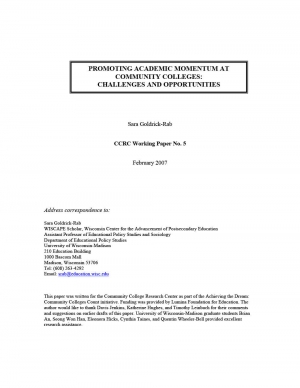
The expansion of the American community college has not been matched by the rapid, or even consistent, progress of all entering students toward postsecondary credentials. Instead, a significant proportion of students enrolled in community colleges appear stuck on the road to completion. This lack of progress is due to the complex ways in which social and educational inequalities affect specific students and the institutions of higher education designated to serve them. As a result, policymakers and practitioners face significant challenges in their efforts to promote academic momentum.
In the first part of this literature review, the sources of these challenges are located in student characteristics as well as in state and institutional practices and policies. It is argued that there exists an interaction of sorts between the actions of community colleges and the attributes of their students. Acknowledging the myriad complexities in efforts to improve the progress of all two-year students toward goal or degree completion, the second part of this paper examines empirical research to identify opportunities for improvement.
